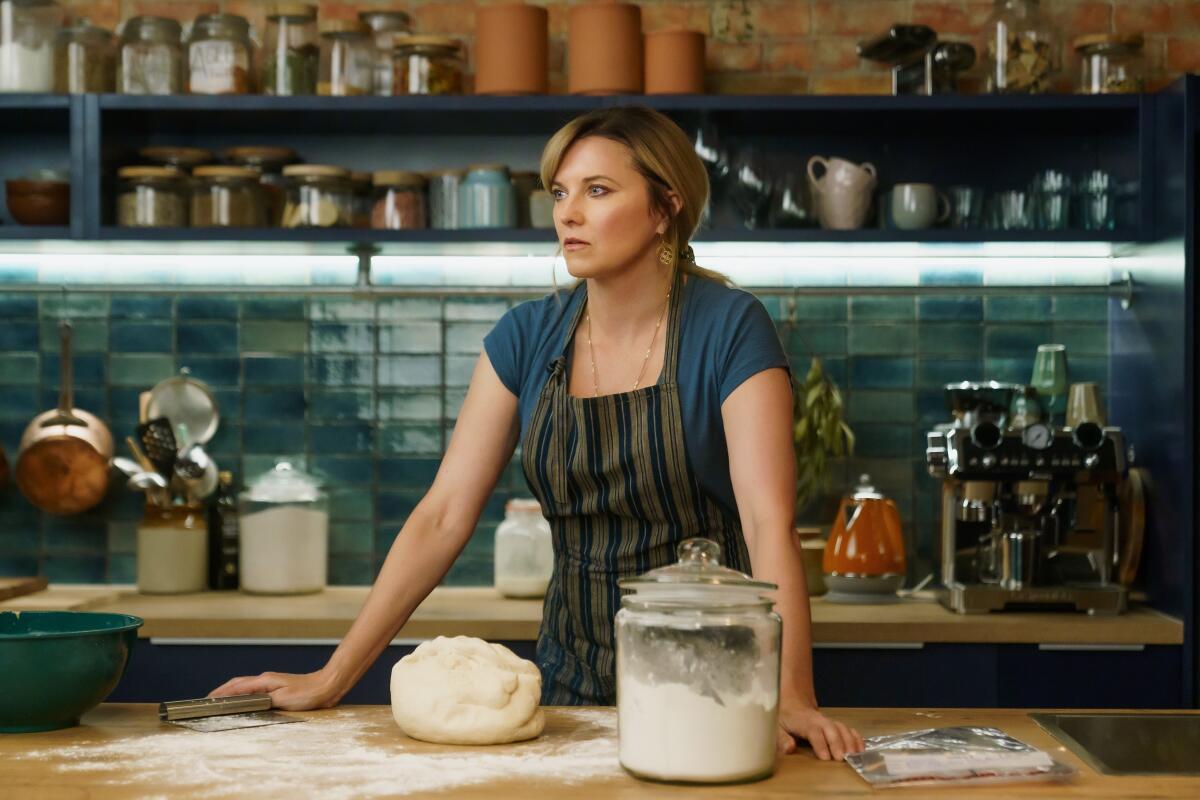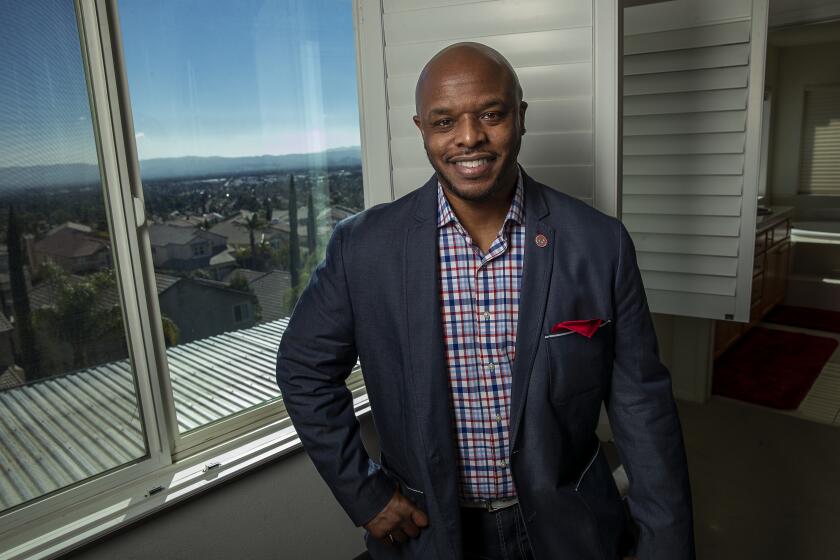Streamer Acorn TV is an Anglophile favorite, but can it help AMC compete with Netflix?

- Share via
Known for her iconic title role in “Xena: Warrior Princess,” actress Lucy Lawless said she “got tired of sex and violence” a couple of years ago and took on the role of Alexa Crowe in the Acorn TV series “My Life Is Murder.”
There is not a bustier or sword in sight on the show, in which Lawless plays a restless police detective forced into retirement. She often wears an apron, bakes bread and talks to her cat.
“I wanted to challenge myself and do something in my own accent,” Lawless said recently interview from her home in Auckland, New Zealand, where the show’s second season was filmed. “People want to be friends with Alexa.”
Lawless’ breezy whodunit is the kind of video comfort food that fans of Acorn, the streaming service specializing in British dramas and other programs from overseas, expect — dialogue-driven shows with strong character development and satisfying resolutions. If there are a few scenes set in an English garden, even better.
“There are no anti-heroes,” said Miguel Penella, president of streaming services for Acorn TV’s parent company, AMC Networks. “Our protagonists try to do the right thing under difficult circumstances.”
Now celebrating its 10th anniversary, Acorn TV has become a key piece of AMC Networks’ effort to gradually pivot from old-world cable to the new age of streaming. The home of cable channels AMC, BBC America and SundanceTV, AMC Networks is using its boutique approach to programming to compete with Netflix and other larger media conglomerates dominating the streaming arena.
Acorn was ready-made for the task when it was acquired by AMC in 2018. The company had a loyal customer base when it was Acorn Media, a direct marketer of VHS cassettes and later DVD releases of such British favorites as “Doc Martin” and “Foyle’s War,” the acclaimed series about a detective working cases during World War II.
When Acorn executives saw home video consumers shifting from physical media to streaming in 2007 with the emergence of Netflix and Apple downloads, the company started planning for the technology shift that has transformed television viewing habits.
Acorn is now one of six streaming services from AMC Networks, which still sees the bulk of its nearly $3 billion in annual revenue come from cable subscriber fees and advertising. The company offers Sundance Now, which has films, dramas and true crime stories. Shudder is for horror fans. IFC Films Unlimited focuses on independent movies. ALLBLK is dedicated to works from Black creators. AMC+ offers a selection of shows such as “The Walking Dead” from the company’s cable channels.
Collectively, the services are projected to have more than 9 million subscribers by the end of 2021; AMC has a target of 20 million subscribers by 2025. AMC does not break out the figures or financial data for the individual services, but it said in its last earnings report that streaming subscriptions grew overall by 157% in 2020.
The question Wall Street has about the publicly traded company is whether the streaming growth can mitigate the steady loss of pay-TV subscribers through cord-cutting, which is a long-term threat to all cable TV networks. (AMC Networks saw its pay-TV subscriber revenue decline by 11% last year.)
“They are trying to walk a tightrope,” said Steve Nason, director of research for Parks Associates, a consulting company that tracks consumer technology services. “They don’t want to sabotage the traditional TV business — that’s their bread and butter. But they realize streaming is going to be their bread and butter five years from now.”
Analyst Michael Nathanson of MoffettNathanson said in a recent report that AMC’s strategy is a “manageable shift” into streaming that could lead to meaningful revenue growth over time.
AMC executives do not expect its small services to displace big streamers such as Netflix or the Walt Disney Co.’s Disney+. The goal is to be the streaming subscription consumers feel passionate enough about to keep along with one of the behemoths.
“As competition continues to ramp up in the streaming universe, it makes us even more organized around the principle that we likely won’t be your only streaming service, but we think we can be your favorite streaming service for a percentage of TV viewers,” said Ed Carroll, chief operating officer for AMC Networks.
While Acorn’s niche is well-defined, it has stepped up its investment in original programming after years of depending on acquisitions of established series and co-productions with other international broadcasters. In recent years, it launched original productions “Agatha Raisin,” starring Ashley Jensen as a crime-solving public relations specialist, and “Whitstable Pearl,” with Kerry Godliman as a single mom who starts a private detective agency.
The service, which offers 3,000 hours of programming in total, has six new original series launching this year and nine slated for 2022, including “Darby and Joan,” an eight-episode mystery set in Australia and starring Bryan Brown and Greta Scacchi.
“We know what our customers love, and there is no better way to give them what they love [than] to make it ourselves,” said Matt Graham, general manager for Acorn TV and Sundance Now.
Ownership gives Acorn the exclusive rights to stream its programs in countries around the world, which will help accelerate its expansion. The service is now available in a dozen countries.
While Acorn made its bones with fans of British TV, it has expanded to include programs from Canada, Ireland, New Zealand, Australia and even non-English-speaking countries.
The service had to broaden its geographic boundaries after BritBox, a joint venture between the BBC and ITV, launched in 2017. Many of Acorn’s shows were ITV programs and were headed to the British programmer’s new service. PBS, the U.S. broadcast home of many British series that have appeared on Acorn, has also entered the streaming market.
ALLBLK was the first streamer to focus on TV shows and films made by Black creators when it started in 2014. Later this month, it will launch its first weekly talk show as it faces more competition.
Acorn executives take a handmade approach to developing shows, as data on subscribers and years of direct marketing experience in home video, give them a clear picture of their consumers. They tend to be over 45, avid readers, well-educated and more affluent than the average consumer. They don’t need to see a lot of stunts or special effects, which helps Acorn keep the costs of its original programs in the range of $1 million an hour.
“We listen to our customers to make sure we’re getting it right,” Graham said.
Although far from ComicCon-like frenzy, some Acorn fans are rabid enough to sign up for the company’s tour packages, where they can fly to England, visit the location of a favorite show and meet the cast, producers and writers. (The trips have been suspended during the COVID-19 pandemic but will eventually resume).
Even the actors on the shows are asked to think about what viewers want.
”Dealing with Acorn is personal for me,” said Lawless. “There’s a covenant between the filmmakers, your audience and the streamer.”
More to Read
Inside the business of entertainment
The Wide Shot brings you news, analysis and insights on everything from streaming wars to production — and what it all means for the future.
You may occasionally receive promotional content from the Los Angeles Times.












